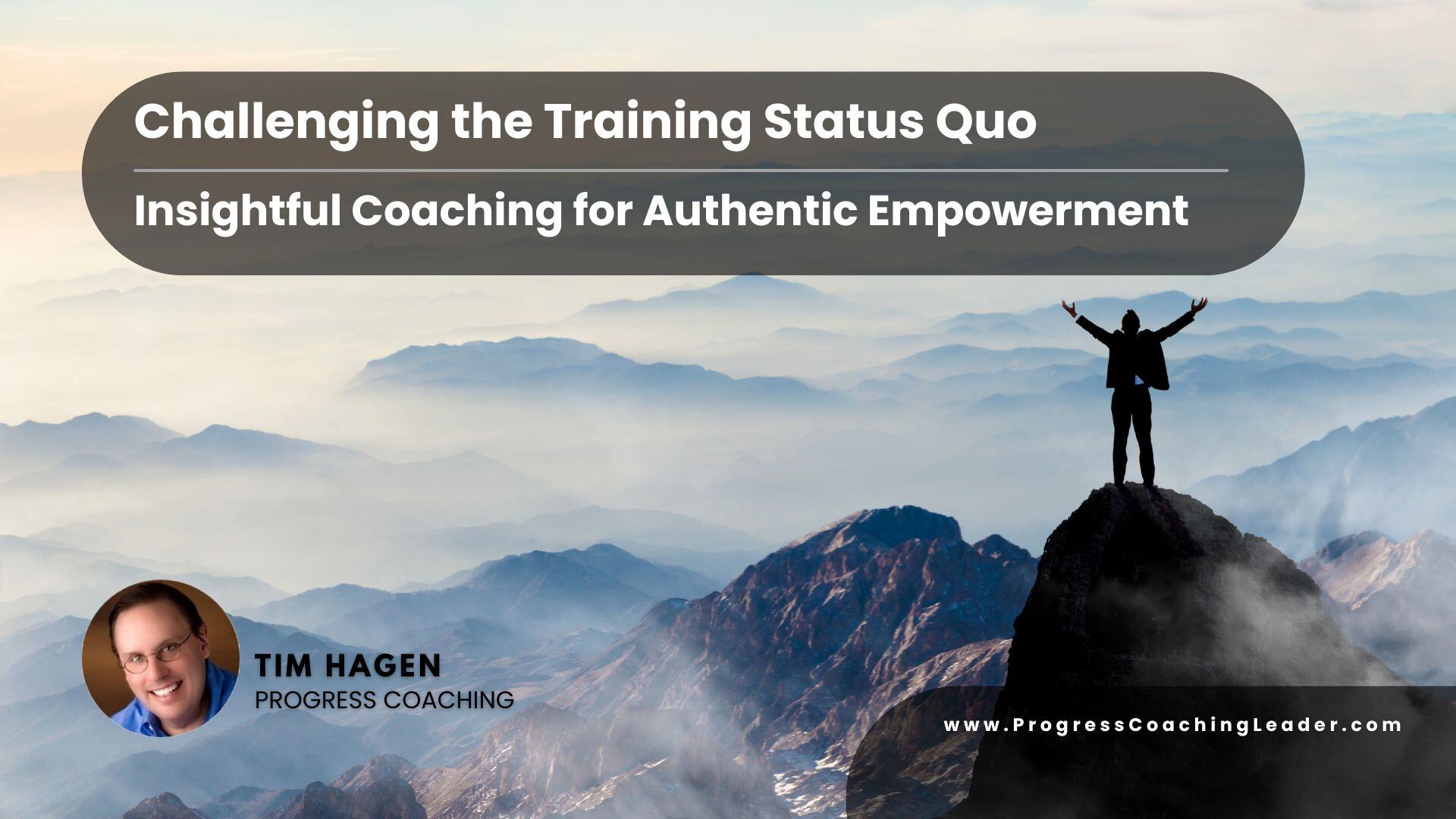Challenging the Training Status Quo: Insightful Coaching for Authentic Empowerment
Ever found yourself echoing the end-of-year corporate chorus for "more training"? Buckle up, because we throw a wrench in that all-too-familiar refrain. Look behind the scenes of a wealth management firm's moment of reckoning, where traditional training is put under the microscope. Amidst a backdrop of sales challenges and the clamor for additional negotiation skills courses, these candid insights sparked a pivotal shift in the conversation, urging us to question if what we're really craving is not more training, but more effective coaching and mentoring.
Read the story of how we cut through the tension and noise of a boardroom drama with thought-provoking questions, shifting the focus from training to empowerment. This isn't just a story about a meeting gone sideways; it's about the hard truths and responsibilities leaders must face when cultivating their teams. Confront the conventional with an appetite for change, and see why sometimes, the best answers come from asking the right questions.
For the past three or four decades, we've had clients with this similar challenge. Every year, I sit in a board meeting, L&D team meeting, or meet with an executive team, and we always hear this at the end of the year: we need more training. Whether it's from the Human Resources department, executive team, talent development team, or L&D, they've all said the same thing. They want more training.
Training is not the problem.
What's really going on is the practice of a leader absolving herself or himself of coaching and mentoring, which are two of the greatest forms of reinforcement for learning, and instead says, "We need more training." What they're doing is something called the transfer of ownership.
Let me tell you a quick story. This happened with a wealth management firm where I was invited by the CEO to sit in on one of their executive meetings. He said they were struggling with some objections and pushing sales, and really wanted my opinion. "Could you come in and observe?" I said sure.
When someone says, "Come in and observe," that does not mean, "Tim, interrupt, insert yourself." I struggle with this because I want to help. So I just sat there listening, and all of a sudden, the CEO turned to me and said, "Tim, you're kind of quiet."
Up to this point, the VP of sales at this wealth management firm said they needed a training course on negotiation skills and objection handling. The two ladies from the training department took notes feverishly, writing down everything they needed. And I just cringed. I couldn't help thinking to myself this was ridiculous. Of course, I didn't say anything.
The CEO urges again, "Tim, you're awful quiet. What's going through your mind?"
I said, "Well, you wanted me to observe, and I don't want to insert myself." The VP looked at me and urged he'd be open to my feedback.
"No, I don't think you will be," I replied. "I don't think you'll like what I have to say."
He continued to urge me to share. I finally--reluctantly--agreed.
I started talking about the challenges with training. I forget the specific words I used in the beginning, but I started asking some questions. Finally, the VP said to me, "Can I ask you something? Do you have much experience in wealth management services?"
That really was such a ridiculous response. Remember, he was the one who called the meeting because he had needs. The CEO asked me to come in and help. The man's question was a deflection. What did industry experience have to do with this situation? Nothing. So, I said no I didn't.
He started laughing. "I think when you come in to sell a company, you should really be prepared for that question."
"Well, wait a minute," I replied. "Are you under the impression I'm in a sales meeting?" He said yeah.
I turned back to the CEO. The CEO told everyone, "No, Tim's not here to sell anything. I asked him, as a favor, to come and listen to see if he could help us."
I turned back to the VP and said, "I'd like to really dive into this if you're cool with it."
I could see the air go out of him at this point. He agreed.
"How long have you been doing this?" I asked him. He said around 17 years. "Wow, you have a lot of experience."
"Yeah, I do," he said.
"And you're the one with the problem."
At this point, the CEO started smiling. The two ladies in the training department started smiling. The VP was not smiling.
I continued. "I'm going to ask you a question, and I'm going to put you on the spot because I feel a little put on the spot here, and I think I've been unfairly labeled. I'm here to help. I'm happy to help. What is the top objection your people face?"
He said they had the highest fees in the industry.
"Great. What do you have your people saying and doing right now, specific to the response system you would like them to say in the moment?"
He said, "Well, that's why we need a training department."
"Or a training program?" I asked. "So, you are literally having your people say to a rejection, 'Oh, we're going through a training program.' What do you have them actually saying in that moment?"
The VP of Sales was really getting irritated visibly. And he admitted he was. "I'm getting irritated with this."
I said, "That's okay because we're going to get to the heart of this. Training is not your issue."
I turned back to the two ladies and said, "I don't mean to undermine you; I'm not trying to be offensive. Do you have any wealth management experience? Have you ever sold wealth management services?" They said no, so I turned back to Mr. VP.
"They answered the same way I did with the objection you had for me, which was my lack of industry experience. Yet you want them to create a training program?"
The CEO sits forward. "Boy, this is interesting."
I asked the VP of Sales again, "What do you have your sales team saying and doing when faced with the objection?"
Third time, he still would not answer me.
"I'm going to try this another way. How often do your people practice?" The man replied they didn't have time to role-play. They were on the phones all day long.
"So, you're going to implement a training program, then when you come back, you're not going to practice it, you're not going to have it reinforced. You can't even define expectations which..." I turn to the training department folks... "In all due respect, ladies, you probably don't know what those expectations are because he can't define it. You've never sold wealth management services."
This is the training syndrome.
The reason I share this story and dredge all of this up...
I think the same thing is going to happen with leaders in AI.
Leaders are going to say, "Let's just have them sign on to AI."
Remember, we need learners who want to get better. We need learners who are willing to practice their skills. We need leaders and managers to help reinforce their training and practice.
Here is my prediction: coaching is going to accelerate because AI is going to prompt more and more strenuous and important conversations.
Want to boost your coaching and leadership game? We're offering a FREE COURSE to help leaders enhance their coaching abilities with
Lead with Impact: 6 Steps to Building a High-Performance Coaching Culture in Your Organization
This is a 7-day course with video lessons sent to your email throughout the week. You can watch the recorded lessons on your own time at your own pace.
Discover:
-
The best attributes of coaching
-
An efficient framework for coaching
-
The crucial tiers of learning
-
The 3 levels of change
-
The power of questions
-
and more!
Access the free course here: https://upvir.al/156009/lp156009





